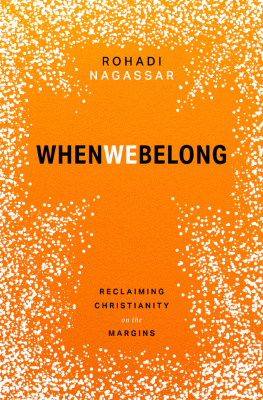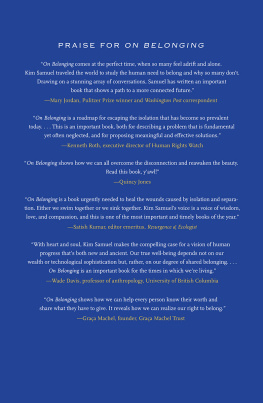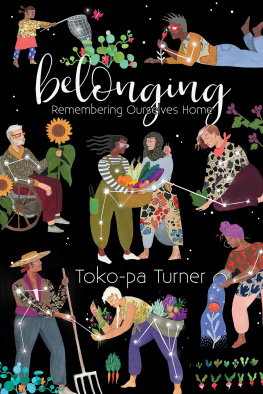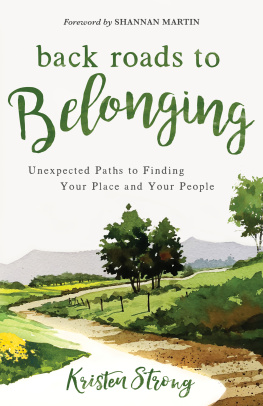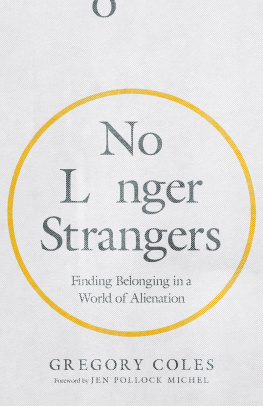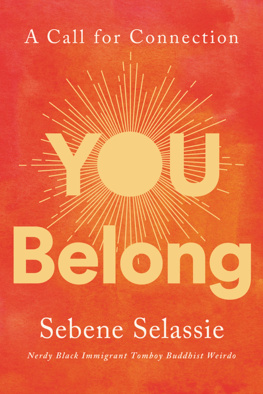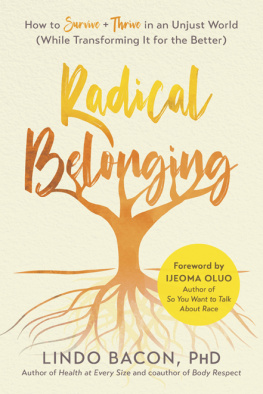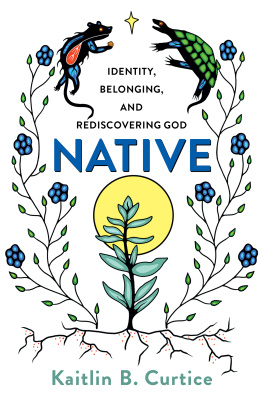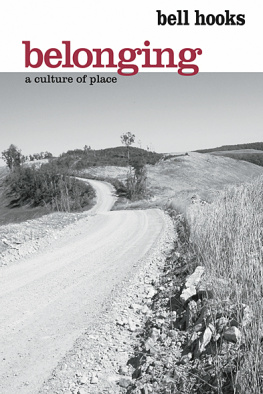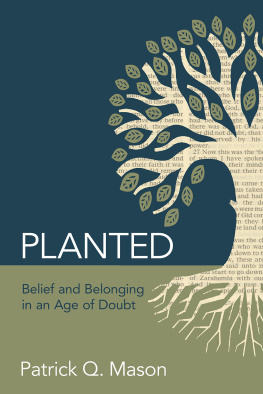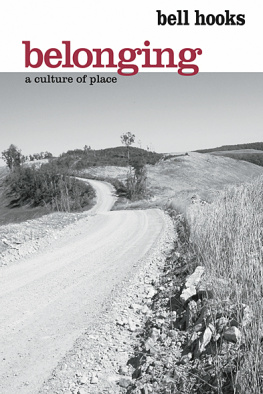Contents

Acknowledgments
It is a gift to write and an even greater gift to have others absorb a written offering in a bid to discover wholeness. Thank you for taking the time to engage this body of work. If it struck a resonant chord, can I ask you for a favor? Please share it with someone who needs it. Also, dont hesitate to find me online. I love hearing stories from others who are discovering their liberation.
Writing is a lonely exercise, and writing during a global pandemic doubly so. That makes the need for a team so important. Thank you to the squad at Herald Press for seeing the value in When We Belong . Thank you in particular to the editors, including Laura Leonard, Sara Versluis, and Elisabeth Ivey.
Thank you, Kaitlin, for your storytelling, and for sharing your words in the foreword.
To every voice that offered an endorsement, including Terence Lester, Sarah Bessey, Gricel Medina, Gena Ruocco Thomas, Trey Ferguson, Blake Chastain, Angie Hong, Carlos A. Rodrguez, Charlotte Donlon, and Ray Aldred. Each took precious time to review this manuscript and offer words of encouragement. Thank you, Drew Hart, for making the connection. Also, thanks to Bernadette Arthur, Chad Lucas, and Monetta Bailey, who gave input on a really early version of this book.
To the ancestors who went before me and paved the way. The Nagassars, Mahs, Wongs, and Murakamis. Look at how far weve come.
Lastly, to my partner Alyssa. You gave me the space and time to spend too many evenings creating this book. Thank you for your love.
The Author

Rohadi Nagassar is a writer, entrepreneur, nonprofit developer, and pastor. He lives on Treaty 7 land in Calgary, Alberta. He currently writes in the areas of antiracist discipleship, deconstruction, and decolonizing the church. He has previously contributed in the areas of church planting, missional thinking, and church revitalization. He is both a practitioner and a thought leader, and co-created two churches, including an inner-city multiethnic expression called Cypher Church. You can find his articles on mission and decolonizing the church at Sojourners , V3, New Leaf Network, Mosaic Ministries, and more. His previous books include Soul Coats: Bible Themed Adult Coloring, Thrive: Ideas to Lead the Church in Post-Christendom , and #changethestory: A Short Resource on Dismantling Racism in the Church . Visit him at Rohadi.com for more, including his podcast, Faith in a Fresh Vibe .
Selected Bibliography
Augustine, Sarah. The Land Is Not Empty: Following Jesus in Dismantling the Doctrine of Discovery . Harrisonburg, VA: Herald Press, 2021.
Barr, Beth Allison. The Making of Biblical Womanhood: How the Subjugation of Women Became Gospel Truth . Grand Rapids, MI: Brazos Press, 2021.
Becker, Palmer. Anabaptist Essentials: Ten Signs of a Unique Christian Faith . Harrisonburg, VA: Herald Press, 2017.
Brown, Bren. Braving the Wilderness: The Quest for True Belonging and the Courage to Stand Alone . New York: Random House, 2017.
Charles, Mark, and Soong-Chan Rah. Unsettling Truths: The Ongoing Dehumanizing Legacy of the Doctrine of Discovery . Downers Grove, IL: InterVarsity Press, 2020.
Cone, James H. The Cross and the Lynching Tree . Maryknoll, NY: Orbis Books, 2013.
. God of the Oppressed . Maryknoll, NY: Orbis Books, 2019. First published 1975.
Crane, Chandra. Mixed Blessing: Embracing the Fullness of Your Multiethnic Identity . Downers Grove, IL: InterVarsity Press, 2020.
Curtice, Kaitlin B. Native: Identity, Belonging, and Rediscovering God . Grand Rapids, MI: Brazos Press, 2020.
Deloria, Vine Jr. God Is Red: A Native View of Religion . Wheat Ridge, CO: Fulcrum Publishing, 2003. First published 1973.
Du Mez, Kristin Kobes. Jesus and John Wayne: How White Evangelicals Corrupted a Faith and Fractured a Nation . New York: Liveright Publishing, 2021.
Ellul, Jacques. If You Are the Son of God: The Suffering and Temptations of Jesus . Translated by Anne-Marie Andreasson Hogg. Eugene, OR: Wipf and Stock, 2014.
Jennings, Willie James. After Whiteness: An Education in Belonging (Theological Education between the Times) . Grand Rapids, MI: Eerdmans, 2020.
. The Christian Imagination: Theology and the Origins of Race . New Haven: Yale University Press, 2010.
McCauley, Esau D. Reading while Black: African American Biblical Interpretation as an Exercise in Hope . Downers Grove, IL: InterVarsity Press, 2020.
Nagassar, Rohadi. Thrive: Ideas to Lead the Church in Post-Christendom . Calgary: RoBarry Publications, 2018.
Selassie, Sebene. You Belong: A Call for Connection . New York: HarperOne, 2020.
Shin, Sarah. Beyond Colorblind: Redeeming Our Ethnic Journey . Downers Grove, IL: InterVarsity Press, 2017.
Tisby, Jemar. The Color of Compromise: The Truth about the American Churchs Complicity in Racism . Grand Rapids, MI: Zondervan, 2018.
Weaver, J. Denny. The Nonviolent Atonement . Grand Rapids, MI: Eerdmans, 2001.
Wilkerson, Isabel. Caste: The Origins of Our Discontents . New York: Random House, 2020.
Wink, Walter. Engaging the Powers: Discernment and Resistance in a World of Domination . Minneapolis: Fortress Press, 1992.
. Naming the Powers: The Language of Power in the New Testament . Philadelphia: Fortress Press, 1984.
Wright, N. T. (Nicholas Thomas). The Day the Revolution Began: Reconsidering the Meaning of Jesuss Crucifixion . San Francisco: Harper One, 2016.
The Search
for Belonging
Theres a peculiar thing about belonging: we all need it but its just so hard to find.
Do you resonate with the struggle to find true belonging? As if only shreds of belonging are accessible, requiring secret passcodes or special fees for entry? Have you noticed that when you happen to acquire a taste of belonging, it dissipates into a mere temporary occasion of just fitting in? Is that enough to fill the emptiness? Or do we need deeper ways to belong despite a world designed to consistently exclude?
Rather than ensuring that belonging is available to all, our society is rooted in foundational barriers. Divisions that determine whos in and who will be pushed to the margins. People like me, who arent white, understand that one of the primary divisions is race. Visible minorities share a deep connection generated from a common suffering and subjugation under the structures of white supremacy. We are reminded daily, and know the feeling in our bones, that finding true belonging will always be elusive.
Ironically, encountering barriers to belonging is a revelation of sorts that would otherwise go unnoticed. Previously disguised features in a world specifically built to marginalized select bodies become known as we encounter them. When we name these hidden pieces, the systems, the cultures, and the beliefs that seek to make us less whole, we begin to tear down the dividing wall. Naming divisions, questioning old ways, and embarking on new paths also has a name: deconstruction. In this way, deconstruction is a pathway unto liberation from all that aint right in the world. Its a process of finding a more beautiful way to belong and live in the fullness of who we are made to be.
Where to find true belonging is the big question. It can feel too big at times and too daunting to even start. So lets add some framework and bring it closer to home, or closer to faith as it were. You are most likely here because some aspect, or perhaps the whole, of your faith has impinged on your ability to grasp belonging and wholeness in full. In other words, Christianity has become an impediment to finding true belonging. Thats a bold claim, but I know some readers are nodding their head in immediate agreement. People pushed to the margins know. We dont need an explanation to describe the harm and trouble weve encountered in the church, both within the institution and with the people. Just as we name features hidden in society preventing our full belonging, so we must do the same for the church.

